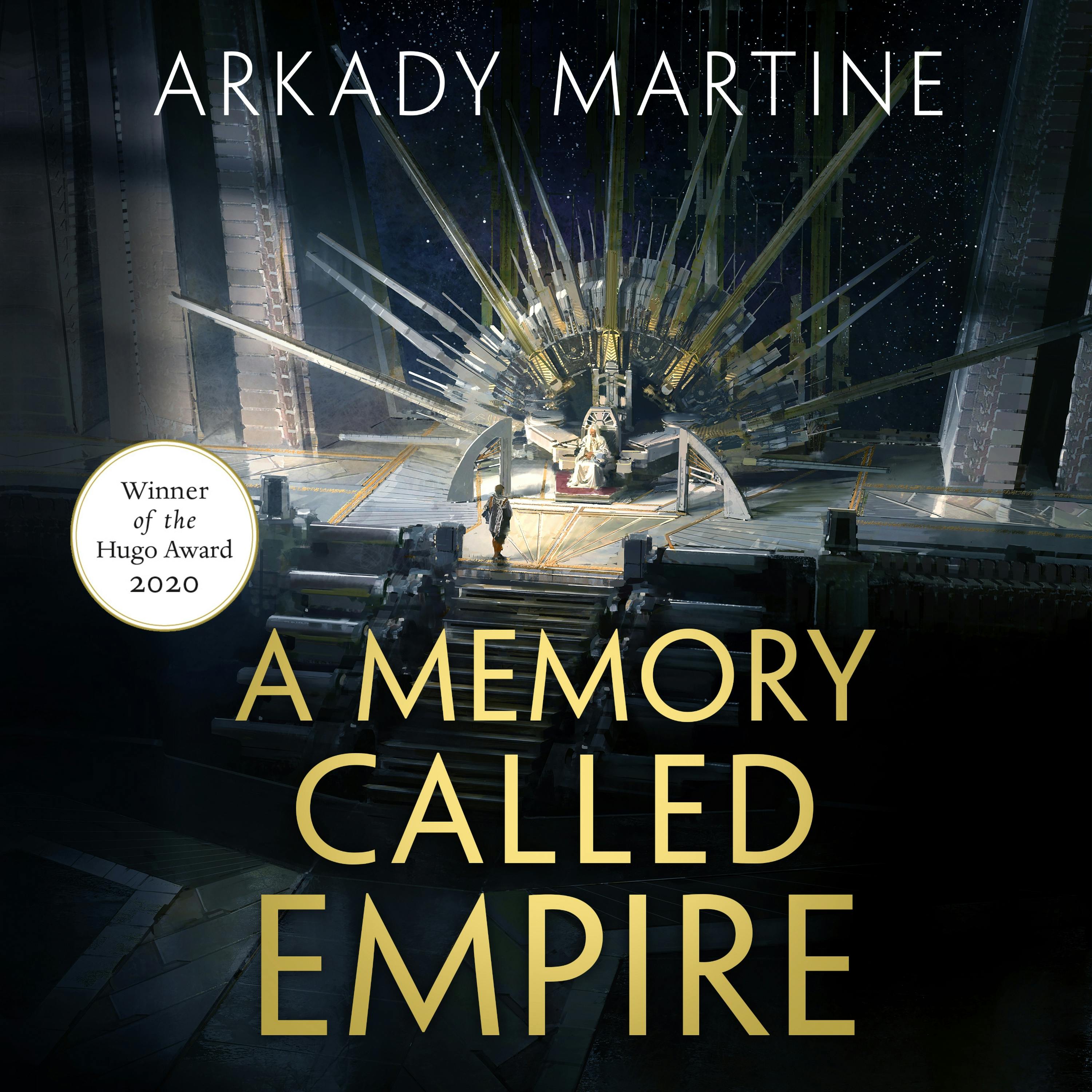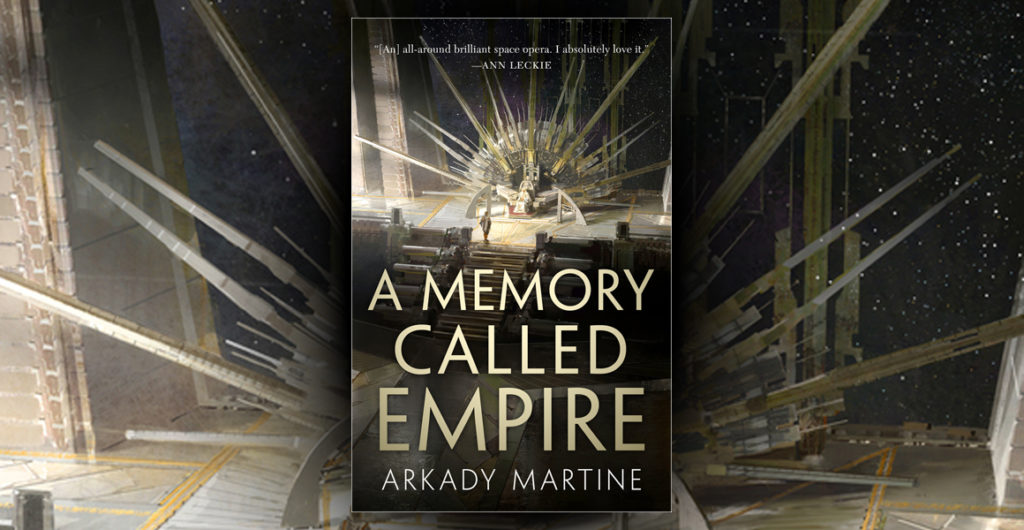"A Memory Called Empire": Explore The Sci-Fi World & Reviews
Can a single novel truly transport you to another universe, challenge your understanding of identity, and leave you pondering the complexities of power and belonging? Arkady Martine's debut novel, A Memory Called Empire, does precisely that, offering a stunning exploration of these themes within a richly imagined science fiction setting.
A Memory Called Empire, published in 2019, marks the arrival of a significant voice in contemporary science fiction. The novel is the first installment in the Teixcalaan series, immediately captivating readers with its intricate world-building, compelling characters, and thought-provoking themes. It quickly gained recognition, winning the 2020 Hugo Award for Best Novel and the 2020 Compton Crook Award, as well as earning nominations for the Nebula, Locus, and Clarke Awards, solidifying its place as a critically acclaimed work.
The story centers on Mahit Dzmare, the ambassador from Lsel Station to the Teixcalaanli Empire. The Teixcalaanli Empire governs a vast expanse of human-inhabited space and is poised to annex Lsel, an independent mining station. Mahit's arrival in the opulent, and often dangerous, imperial capital of Teixcalaan is driven by the mysterious death of her predecessor. This event plunges her into a web of political intrigue, cultural clashes, and personal challenges. The narrative is a masterclass in weaving together multiple narrative threads, with the author skillfully balancing political maneuvering, cultural exploration, and the emotional journey of the protagonist.
Mahit's situation is further complicated by her unique circumstances. She not only finds herself an outsider in the imperial court but also carries a 'device' a cultural artifact that has been implanted within her, giving her access to the memories and personality of her predecessor. This introduces the theme of identity with a fascinating complexity. This layering of identities reflects the merging of Lsel and Teixcalaan, of the independent and the colonized. It also pushes Mahit into a unique position where she has more than one identity crisis on her hands: A deep affinity for the empire that wants to annex her home and also literally has someone elses personality nested in her brain.
The novel skillfully blends elements of science fiction and historical fiction, drawing inspiration from the Byzantine Empire, which the author researched extensively. The Teixcalaanli Empire, with its complex social structures, sophisticated technology, and intricate court politics, feels both familiar and alien. Martine demonstrates a remarkable ability to craft a world that is both believable and original, showcasing the richness of the setting. Martine explores the intersection of culture and power and questions the very nature of civilization and selfhood.
The Teixcalaanli Empire, the setting for A Memory Called Empire, presents a compelling case study in how societies evolve, interact, and sometimes clash. It is not simply a backdrop, but a living, breathing entity with its own history, culture, and inherent contradictions. The imperial court is a hotbed of alliances and betrayals, where language, art, and performance are vital tools of diplomacy and control. The author takes the reader on a journey through this empire, unveiling its inner workings and illustrating the complex forces that shape its destiny. The author masterfully crafts a world where beauty and efficiency are intertwined, where the architecture and engineering reflect the ethos of the ruling class, and where the echoes of the past resonate through the present.
- Cali Carter Reviews Booking Experiences Your Guide
- Best Iphone 13 Mini Cases Stylish Protective Options
The intricate political landscape of the Teixcalaanli Empire is a core element of the novel's appeal. The author delves into the machinations of power, revealing the constant struggles for influence and the delicate balance of alliances. The stakes are always high, as every action has the potential to shift the power dynamics, leading to unexpected consequences. The book skillfully explores themes of cultural exchange, the clash between tradition and progress, and the impact of technology on society.
The concept of cosmopolitanism is subtly interwoven into the narrative. The reader encounters a world of diverse cultures and perspectives, where understanding and communication become crucial. Cosmopolitanism is challenged, questioned, and ultimately redefined throughout the story. The notion of belonging is tested as Mahit, an outsider, navigates the complexities of imperial society. As an ambassador from a smaller, independent station, she must represent her people while also trying to survive the treacherous political climate, forcing her to confront her own identity and allegiances.
The novels focus on language is also noteworthy. The Teixcalaanli Empire places immense value on poetry, viewing it not just as art but also as a form of communication and control. The intricate layers of meaning within the empires language, and the use of a complex form of poetry, are central to the plot. This highlights the power of words and the subtle ways in which language can shape perception and influence decisions. The authors meticulous attention to language adds depth and richness to the world she has created, allowing readers to fully immerse themselves in the intricacies of imperial culture.
The publication history of A Memory Called Empire is also significant. The book was published in 2019 by Tor Books in North America and by Tor UK/Macmillan in the UK and other English markets. The book's quick ascent to recognition, evident by its prestigious awards and nominations, indicates the strong resonance it found with both critics and readers. The sequel, A Desolation Called Peace, further expands the narrative and confirms Arkady Martines role as a leading voice in contemporary science fiction.
The novel's success is a testament to Martine's skill in crafting a compelling narrative that deftly balances action, intrigue, and philosophical depth. A Memory Called Empire succeeds in not just entertaining but also making the reader think about complex issues such as identity, belonging, and the implications of power.
The novel is not just a work of science fiction, but a mirror reflecting the human condition. It confronts the consequences of colonialism and the challenges faced by those caught in the crosscurrents of change. The book encourages us to re-evaluate our understanding of history, society, and our place within the larger story of humanity.
The announcement of Memory of the Empire as a band further exemplifies how the themes presented in Martines work extend beyond literature. The band's branding, along with the promotional materials, shows a clear attempt to engage with the same concepts of identity, empire, and cultural exchange explored in the book. The bands existence underscores the broader cultural impact of Martine's work, which has created a dedicated following.
The exploration of cosmopolitanism, as explored in the novel, is also relevant to the concept of 21st-century literature. The themes of identity, the influence of colonial history, and cultural exchange are all prominent themes in postcolonial literature. The book serves as a reminder of how literature can be used to understand the world, and it allows the reader to examine a wide range of literary, social, and historical topics.
The novel has resonated with readers because it offers complex characters who struggle with their identities amid the complexities of political intrigue. Ambassador Mahit Dzmare is one of the most complex and interesting characters in modern science fiction. She must find her way through the intricate political landscape of the Teixcalaanli Empire while also coping with a profound sense of displacement. Her growth and transformation throughout the story keep readers engaged and invested in her fate. As a character, Mahit Dzmare challenges her own ideas of who she is and what she stands for, a struggle that many readers can find relatable.
The book continues to be celebrated for its imaginative world-building and its ability to spark important discussions about the human condition. As the novel takes readers on an odyssey through space and culture, it also brings up topics that are still important in our modern society. It shows us how literature can be used to inspire critical thinking and promote empathy, making it a noteworthy contribution to the genre.
This book continues to gain notice, not just for its compelling narrative, but also for how it tackles complex topics in a thoughtful way. It has sparked discussions on themes such as language, identity, and the impact of cultural exchange, making it a valuable resource for everyone who is interested in literature and cultural studies.
The author crafts a universe that is vibrant and full of life by intertwining the elements of science fiction, dystopian fiction, and historical fiction. The research on the Byzantine Empire enables the creation of the Teixcalaanli Empire, and the outcome is a novel that offers a fresh perspective on society and power. This blend makes the story not only more engaging but also more meaningful and insightful.
The novel provides a starting point for analyzing the development of literature and the influence of literary criticism. The literary criticism includes how the text may challenge and support notions of postcolonialism, language, and cultural identity. By examining how the book handles these complex issues, readers and critics may get a better sense of its lasting influence and significance.
The ongoing cultural significance of A Memory Called Empire can be seen in its continued recognition and the discussions it has sparked. The awards and nominations that the book has garnered indicate its widespread acclaim. The story continues to captivate readers because of its thought-provoking themes and complex characters. Martines work provides a roadmap for analyzing literature, history, and culture, inspiring a new generation of readers and critics.
| Attribute | Details |
|---|---|
| Full Name | Arkady Martine (born Anna Lindner) |
| Date of Birth | October 24, 1985 |
| Place of Birth | New York City, New York, USA |
| Nationality | American |
| Education |
|
| Occupation | Author, Historian |
| Known For | Science Fiction Novels |
| Major Works |
|
| Awards |
|
| Influences | Ursula K. Le Guin, Iain M. Banks, Guy Gavriel Kay, and various historical sources |
| Key Themes | Identity, Empire, Language, Memory, Cultural Exchange, Power, and Political Intrigue |
| Website Reference | Arkady Martine's Official Website |
The success of A Memory Called Empire and the subsequent works, shows that the author is a significant voice in contemporary science fiction. Her ability to craft detailed worlds, explore complex themes, and create memorable characters secures her position as a leading figure in the genre.
- Jon Goodman Real Estate Legal Expertise Your Guide
- Ashley Riches The Rising Star Of British Opera Beyond

Memory Of Empires Ancient Egypt Ancient Greece Persian Empire R

A Memory Called Empire

Six Things I Borrowed Wholesale From History for A Memory Called Empire